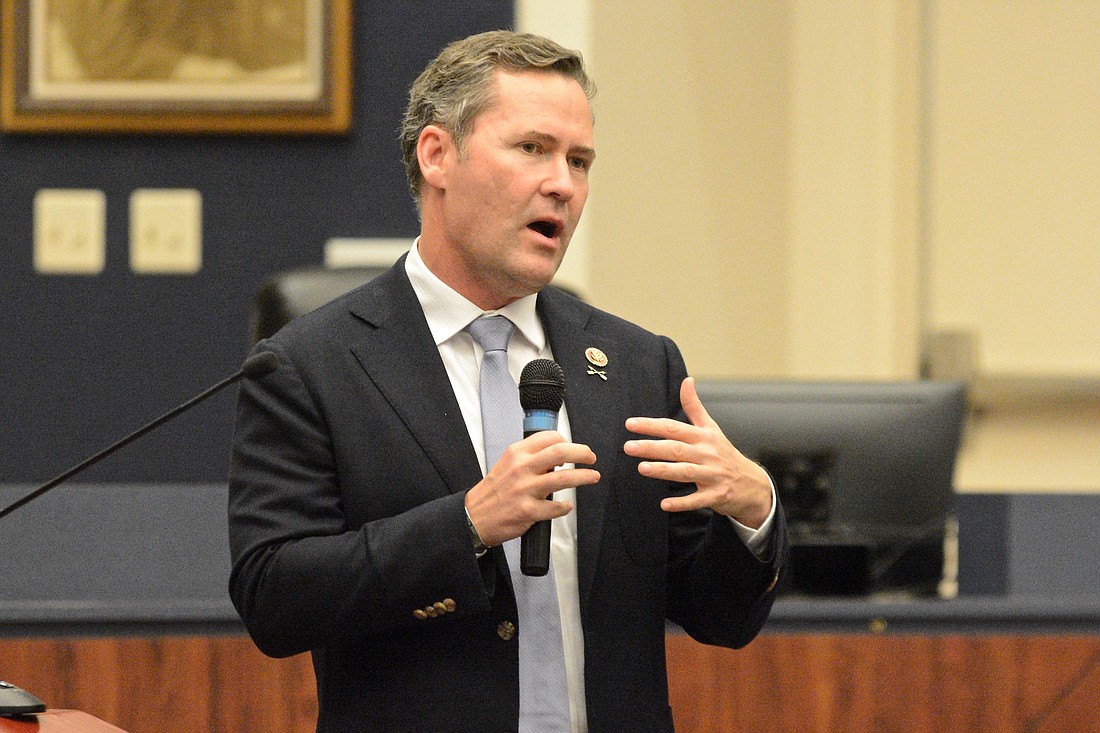- March 9, 2025

As testing for COVID-19 increases, the government should be more able to make targeted decisions about things like isolation and quarantines, U.S. Rep. Michael Waltz said during a telecom interview with the Flagler Tiger Bay Club on March 26. Waltz represents Florida's Sixth Congressional District, which includes Flagler County.
"We’re trying to walk a fine line," Waltz said. "We are fighting a two-front war, and what we’re doing on the public health side has … obviously impacts on the economic side, and that is not an easy line to walk, and that is not an easy balance to strike."
"We are fighting a two-front war, and what we’re doing on the public health side has … obviously impacts on the economic side, and that is not an easy line to walk."
— MICHAEL WALTZ, U.S. representative for Florida's sixth congressional district
Waltz said the federal and state government have been working "somewhat blind" on measures to take during the pandemic, because testing has been limited so far.
"We're having to take very broad, societal measures, until we can ... get the testing in place so that we can make more individualized decisions in terms of quarantine and isolation, rather than mass societal," he said.
At this point, he said, the federal government is leaving much up to state and local officials.
"The approach the president has taken, which I support, is essentially letting the governors and in some cases local officials, make those decisions, while the federal government supports from a resources standpoint, as it should," he said. " ... So rather than a one-size fits all sledgehammer, we’re trying to at least keep those divisions at the state level, and some governors are keeping them down even more at the local level."
Waltz reviewed elements of the federal stimulus bill, which passed in the House on Friday: Individuals will generally receive $1,200 per person or $2,400 per couple, plus $500 per child, with the amount decreasing for individuals making more than $75,000 per year or couples making more than $150,000 per year.
For businesses, he said, "There’s a multitude of avenues of relief coming. ... By the end of next week, businesses should be able to go to your bank … and present your payroll and overhead, and receive a grant for two-and-a-half times your average monthly payroll … as long as you keep those folks employed that you utilized to make that calculation."
The Small Business Association is also offering a number of disaster loans and micro-loans for businesses, he said.
There are also provisions to help protect seniors' financial health, he said. "For seniors who are currently mandated to take withdrawals from your 401K or IRA ... you won't be penalized," he said. "You no longer have to take those mandatory distributions and sell your assets into what is obviously a very down market."
Individuals will also be able to take a certain amount of money for coronavirus-related expenses out of their retirement accounts early, and the government will waive the standard 10% penalty, Waltz said.
To protect the county in the future, Waltz said, he and Sen. Marco Rubio are working on legislation that would require that "active pharmaceutical ingredients," key elements of the pharmaceutical supply chain, be sourced domestically or from certain key allies, so that U.S. isn't relying during a pandemic on ingredients from countries like China — where state media has raised the possibility of withholding them from the U.S.
"In that sense ... as a nation, we were unprepared," Waltz said. "We had a lot of companies that were producing there because it was cost-efficient, and I’m a free market guy and I’m all for that if it reduces costs for our health care system ... but we have to draw the line when it comes to national security."
Waltz has also pushed for a "public health reserve corps" of retired health care workers that would be able to help during a pandemic.
"I don't think this is necessarily just for the future," he said. "It could be for round two or round three of this particular virus."